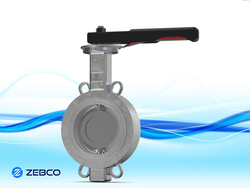
Zebco Engineering LLP | E-Showroom

Zebco Engineering LLP | E-Showroom

All valves shall meet API-609 MSS-SP-67 ISO 5272 face-to-face dimensions. Valve sizes from 2" to 12" are rated at 200 psig WOG service and valve sizes from 14" to 30" are rated at 150 psig WOG service. All valves are full rated on dead-end service. All bodies shall be ductile iron 65-45-12 and bi-directional tested in both directions and be bubble tight with zero leakage. Lug bodies shall be full lug rated and all bodies shall be suitable for ANSI 125/150 lb, JIS, DIN or B.S. Flanges. Secondary seals shall be self-adjusting. All elastomers, all internal bearings shall be non-corrosive and non-metallic. All seats shall be suitable for 250F sustained high temperature and capable of 2000 PPM on chlorinated applications.
Advantages of Butterfly Valves:
Open and close easily and quickly, effort, fluid resistance is small, can operate frequently.
Simple structure, small size and light weight.
It can carry mud, with the least accumulation of fluid in the pipeline opening.
Low pressure, it can achieve a good sealing.
Good regulating performance.
Many different types of valves are used in flow control. They are used for a variety of reasons, such as phase (liquid or gases), pressure, piping restrictions and solids content. Other valves are chosen for their capability to open and close in a quarter turn. Of all the valve types, the butterfly valve is used as a control device for many reasons including some or all of the above.
This article explains the workings of a butterfly valve and its operation. The butterfly valve offers many advantages that include quarter-turn, openness for less plugging and good control capabilities. Both manual and control versions are used.
All valves shall meet API-609 MSS-SP-67 ISO 5272 face-to-face dimensions. Valve sizes from 2" to 12" are rated at 200 psig WOG service and valve sizes from 14" to 30" are rated at 150 psig WOG service. All valves are full rated on dead-end service. All bodies shall be ductile iron 65-45-12 and bi-directional tested in both directions and be bubble tight with zero leakage. Lug bodies shall be full lug rated and all bodies shall be suitable for ANSI 125/150 lb, JIS, DIN or B.S. Flanges. Secondary seals shall be self-adjusting. All elastomers, all internal bearings shall be non-corrosive and non-metallic. All seats shall be suitable for 250F sustained high temperature and capable of 2000 PPM on chlorinated applications.
Advantages of Butterfly Valves:
Open and close easily and quickly, effort, fluid resistance is small, can operate frequently.
Simple structure, small size and light weight.
It can carry mud, with the least accumulation of fluid in the pipeline opening.
Low pressure, it can achieve a good sealing.
Good regulating performance.
Many different types of valves are used in flow control. They are used for a variety of reasons, such as phase (liquid or gases), pressure, piping restrictions and solids content. Other valves are chosen for their capability to open and close in a quarter turn. Of all the valve types, the butterfly valve is used as a control device for many reasons including some or all of the above.
This article explains the workings of a butterfly valve and its operation. The butterfly valve offers many advantages that include quarter-turn, openness for less plugging and good control capabilities. Both manual and control versions are used.